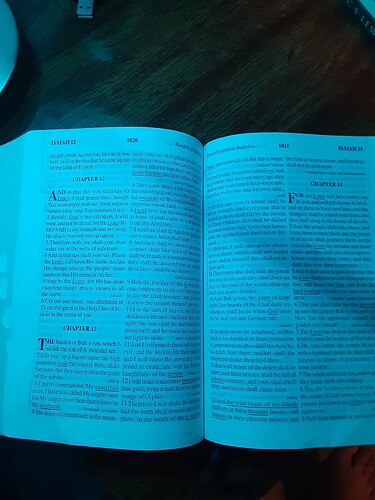We read “Yahweh [of] armies” (1:24–25) mustering a great army (v. 4–5). It is a particularly appropriate way to speak of God when Isaiah is describing the great Day when the forces of heaven and earth are in battle.
The prophecy’s universal nature emerges in the intended scope of the destruction. It covers “the whole ’erets.” That could simply mean the whole country, but it can as easily mean “the whole earth” (v11. NRSV).
A vision of destruction of one land is in microcosm a vision of the destruction of the whole world. Or a vision of destruction of the whole world is made concrete in the destruction of one people, to which verse 1 has alerted us.
In verse 6 the NIV margin notes that the word Almighty is not “armies,” as in verse 4, but shadday. no one knows what this name means, but here in Isaiah the point of it is clear, for the word for destruction is shod, so that the juxtaposition of the two words invites the hearers to see Yahweh as Destroyer by name and as therefore eminently capable of effecting the day of destruction.
The response of verses 7–8 is therefore not surprising!!!
But Isaiah 14.
The prophet saw in this event something far deeper than the defeat and fall of the king of Babylon, he saw the defeat of Satan, the “prince of this world,” who seeks to energize and motivate the leaders of nations (John 12:31; Eph. 2:1–3). Daniel 10:20 indicates that Satan has assigned “princes” (fallen angels) to the various nations so that he can influence leaders to act contrary to the will of God.
This highest of God’s angels tried to usurp the throne of God and capture for himself the worship that belongs only to God (Matt. 4:8–10).
The name “Lucifer” (“morning star”) indicates that Satan tries to imitate Jesus Christ, who is “the bright and morning star” (Rev. 22:16). “I will be like the Most High” reveals his basic strategy, for he is an imitator (Isa. 14:14; 2 Cor. 11:13–15).
Like the king of Babylon, Satan will one day be humiliated and defeated. He will be cast out of heaven (Rev. 12) and finally cast into hell (20:10). Whether God is dealing with kings or angels, Proverbs 16:18 is still true: “Pride goes before destruction, and a haughty spirit before a fall” (NKJV).
